#Northfield High School
Explore tagged Tumblr posts
Text
Baseball runts

"Runt" is out. In its stead is "kid".

Given that the characters are designated as good and pure versus evil and cheating -- and good gawd, it's just a high school baseball game -- I don't really understand why bad behavior is shoved out of the bad sides' mouths and thoughts.
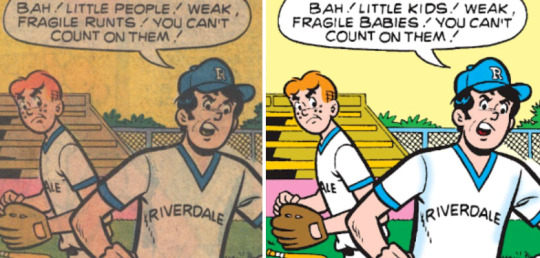
I always have a bit of a hiccup on terminology. "Little People" has come to be the acceptable terminology for what has come to be seen as pejorative term "midget". The Wikipedia page predictably page slides the controversy with someone of note saying the " just use 'midget'" versus the edicts of Hockey Canada (?) -- and I would think I would be with the midget / little person performer, but easy enough for me to say. "Little people" having an association in my.mind with, say Marie Antoinette jeering at the masses from her her balcony, and I can't imagine that is how I would want to be referred.
Reggie introduces "babies" into the equation. Makes sense that he is saying something pejorative and mean, but as that is the case -- why not stick with "runt"?
#Archie Comics#Archie Andrew#Coach Kleats#Mike Maples#Scooter Jackson#Evil Coach#Baseball#Bounty-gate#Runt#Little People#Northfield High School#Riverdale High School#Stan Goldberg#1977#Etymology
1 note
·
View note
Text
A Letter to My Younger Self
Dear Younger Self, There really is no easy way to tell you this, so I’ll just say it, you will have regret. You will step on someone’s toes when you meant to leap over them and yell when you should whisper and wear the wrong thing to the right place. You will dance when you should sit and sit when you should dance. You will hate what is good for you and love what will leave a mark. Your regret…

View On WordPress
#Art#boarding school#high school#high school graduation#Northfield Mount Hermon#Photography#reflection#younger self
0 notes
Text
Xiong was born in 1973 in Phab Kheb, Laos, one of 11 children in a family that fled the country in 1975 and spent four years in a refugee camp in Thailand before emigrating to the United States, according to Sahan Journal. He grew up in St. Paul and was valedictorian of his class at Humboldt High School in 1992.
Xiong graduated with a political science degree from Carleton College in Northfield in 1996 and began traveling around the country as a motivational speaker, storyteller and rap artist, billing himself as the country's first Hmong comedian.
Xiong helped organize the first Hmong Minnesota Day at the Minnesota State Fair in 2015, and was named a Bush Fellow in 2019 to earn a master's degree in public affairs.
With Xiong's death, the Hmong American community in the Twin Cities has lost a true leader, "consummate organizer and cultural interpreter," said longtime friend Pakou Hang. In his presentations and writings, she said, Xiong was a teacher who tried to show people how to be kind, generous and do the right thing.
Xiong connected people across generational, cultural and political lines who traveled the United States to speak at schools, colleges and businesses, Hang said. As a friend, he could inspire laughter in every conversation, she said.
[Rest of article under cut.]
A highly regarded Hmong American activist, speaker and comedian from the Twin Cities was found dead Monday in Medellín, Colombia, after kidnappers demanded $2,000 in ransom from his family.
Tou Ger Xiong, 50, was killed while on a vacation to Medellín. His brother, Eh Xiong, confirmed his death Tuesday morning on Facebook.
"The pain of his loss is indescribable. We extend our deepest gratitude to all who have offered their condolences, thoughts, and prayers," Xiong's family wrote in the Facebook statement.
Xiong, who lived in Woodbury, was kidnapped Sunday after a date with a woman he met on social media, according to the Colombian newspaper El Colombiano.
A group of men contacted his family demanding $2,000 — the equivalent of $8 million in Colombian pesos — and killed him a day later without collecting the money.
Three American tourists, including Xiong, have been murdered in the last month, El Colombiano reported.
Kidnappings in Colombia are on the rise, according to authorities. In the first few months of 2022, 35 people were abducted in the country, and that figure is more than double this year for the same period.
Early last month, the father of a Colombian soccer star was freed after he was held for around a week by a guerrilla group.
[The excerpt above came from here.]
Former state Sen. Mee Moua of St. Paul, for whom Xiong worked as a volunteer coordinator in her successful 2002 campaign, said in a statement that she was "weighed down with grief for my friend," and called Xiong "a one-of-a-kind modern-day hero."
U.S. Rep. Betty McCollum, D-St. Paul wrote on X, formerly known as Twitter, that Xiong's death was "devastating news" and that his work as a comedian and activist "touched many lives in the Twin Cities and beyond."
Hang said Xiong would perform skits based on his own stories growing up as a refugee and other lessons from the larger Hmong community. She recalled him bringing older Hmong women onto the stage to demonstrate how they would pick corn or fetch water as children, setting it to music and transforming it into a dance.
Xiong sought to connect first-generation Hmong American kids with classmates of other races, and strengthened intergenerational relationships with their families by making them proud to be Hmong, she said.
Xiong and Hang worked together on many community causes, including the formation of the Coalition for Community Relations, a group that traveled to rural Wisconsin from the Twin Cities in 2004 to "bear witness" at the trial of Chai Soua Vang, a Hmong American man eventually convicted for killing six hunters.
"We're not here to defend Chai," Xiong told the Star Tribune at the time. "We're coming together to accentuate the positives in the Hmong community."
Xiong also brought media attention to a hunger strike in Northern California in 2021 after a Hmong cannabis farmer was killed by police, Hang said. He flew to California to lead a march and gather stories. Discriminatory ordinances passed by Siskiyou County were later ruled unlawful.
"We don't have anyone else in the community like that," Hang said.
#asian americans#hmong#the hmong don't get talked about much on here#but many were displaced during the wars in indochina#and came to the us as refugees where they face racism#really sad to see an activist get killed violently
46 notes
·
View notes
Text

The haunting legend of the Northfield Pigman.
On the night before Halloween in 1951, Sam, a mischievous young man, embarked on a prank-filled adventure called Picket Night, which resulted in his mysterious disappearance. Despite extensive searches involving hundreds of locals, Sam's whereabouts remain unknown, giving rise to rumors of demonic possession and sightings of a terrifying creature resembling Sam.
Years later, high school students encountered a horrifying sight during a school dance—a naked, white-haired creature with a pig's head emerged from the woods, sending shivers down their spines and fueling the haunting legends of Sam Harris. Coincidentally, around the same time, in 1971, a farmer reported encountering a man with pig-like facial features rummaging through his trash.
It's unknown whether the Pigman is Sam Harris or the beast that devoured Sam Harris. Legends depict him as a pig-slaughtering, entrail-eating, pig-head-wearing figure who haunts the New England town, instilling fear among the locals. Whispers of bestiality and the existence of half-man, half-pig offspring further add to the eerie tales surrounding Sam Harris.
Since those first sightings, the Pigman has turned into a kind of "rural legend" in Northfield. More than one nighttime traveler has reported encountering the Pigman while driving on a deserted country road, the hairy white beast barely missing the front of their car.
Follow @mecthology for more tales and horrors.
Source: vermonter.com, darntough.com & cryptids.fandom.com
#northfieldpigman#urbanlegends#vermont#hybrid#horror#halloween#tales#scary tales#horror stories#sam harris#weird tales#cannibalistic#mecthology#pigmask#pigman#northfield#american horror
12 notes
·
View notes
Text
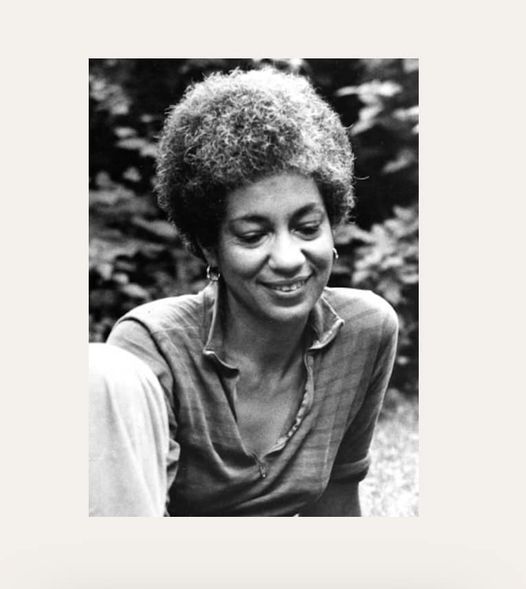
Poet, playwright, activist, educator, and essayist June Jordan was born in Harlem, New York City, in 1936. An only child, she was raised by her Jamaican immigrant parents in Brooklyn’s Bedford-Stuyvesant neighborhood. She began writing poetry at only seven years old. Jordan attended high school at the Northfield School for Girls in Massachusetts and university at Barnard College, which she left without a final degree due to her alienation from the strictly white and male literary curriculum there. She married and later divorced Columbia student Michael Meyer, with whom she had one child. Despite anti-LGTBQ+ stigma at the time, Jordan’s writing openly acknowledged her bisexuality.
The author of 27 books—including essay collections, libretti, and children’s books as well as volumes of poetry—Jordan was also a lifelong activist who fought fiercely for civil rights, women’s rights, LGBTQ+ rights, and anti-war causes. She taught at CUNY’s City College, Yale University, Sarah Lawrence College, and SUNY Stony Brook before being appointed professor of African-American Studies at the University of California, Berkeley, where she founded Poetry for the People. Jordan’s many accolades include grants and awards from the Rockefeller Foundation, the National Endowment for the Arts, PEN America, the National Association of Black Journalists, and numerous other institutions. She died of breast cancer in 2002. A widely influential poet who worked in accessible language to convey deep truths around identity, Jordan is celebrated today for both her literary writing and her dedicated advocacy for social justice and historically excluded groups.
Why are you posting this @alivesoul?
Because June Jordan taught a class at the University of California Berkeley called Poetry for the People and that class has been permanently cancelled. A shame. Teacher/Poets are essential to any higher learning experience as poetry informs us in every way of the world around us. I can't imagine my college experience without the poetry of Nikki Giovanni, Quincy Troupe and so many others. Beyond that, June is a truth hunter, a truth gatherer, and a truth provider---a modern day griot. I truly hope she finds a safe space within the diaspora to continue her work as she represents the very best of what it means to be Black in this country. The attack on Black intellectuals from Ta-Nehisi Coates to Claudine Gay is truly one of the great academic and cultural crimes of my lifetime and cannot continue to go ignored. Never have I seen so many highly educated and accomplished black men and women so unfairly attacked and discredited. These men and women are literally trying to save the soul of country by shining a light on the FACTS of our history, present AND on those who would profit from lies, greed and violence. If there is one thing I would implore those who read this blog to do, it is to read, study and protect not only our history but those who make it their business to make sure it is never forgotten.
We are excellence.
Peace.
18 notes
·
View notes
Photo


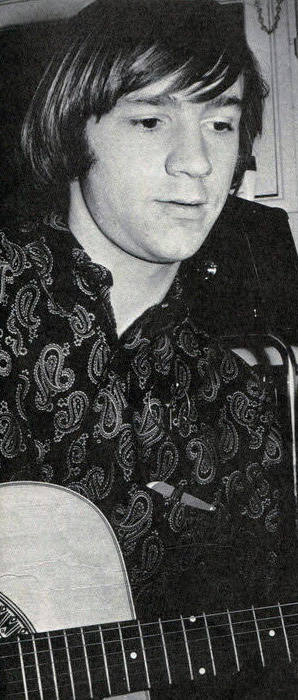

Peter Tork, 1966.
“Local Singer Debuts On NBC-TV Sept. 12 Mansfield (Special) — A local folk-singer will make his television debut Sept. 12 when The Monkees’ premiere on the NBC network at 8 p.m. Peter Thorkelson, 24, is the son of Prof. and Mrs. John Thorkelson of Wormwood Hill Road. Known professionally as Peter Tork, [he] has been interested in folk singing and the guitar for the past 15 years. A 1959 Edwin O. Smith High School graduate, he attended Carlton [sic] College in Northfield, Minn. While there he was a disc jockey for the college radio station. Thorkelson as been entertaining in Greenwich Village and Hollywood, Calif. for the past three years. During his year at Smith, he was a reporter for the school humor magazine and was active in the drama club. Before attending Smith, Thorkelson completed three years at Wyndham High School where he was active in the drama, rifle and French clubs and was a member of the school band. […] Peter will be flying into New York with the other cast members, to spend the weekend with his grandmother, Mrs. Cait Strauss [sic].” - Hartford Courant, September 3, 1966
"[When I lived in New York] I also taught a bunch of kids up in Westchester for awhile. I wonder if they remember me now." - Peter Tork, The Monkees: Here We Are (1967)
“I arrived on the Village scene the winter of ‘61, and stayed there for about two and a half years. I played guitar and banjo. I came to the Village for glamour, excitement, hippiedom, the liberal lifestyle, free love. I was on the basket-passing circuit in the smaller clubs, like the Basement, the Cyclops and the Id. I later played Gerdes. What I was working towards was to be in a group. When the Beatles hit, where were all the folkies going to go? But I also wanted to be a folk music performer. A lot of what I did was hanging out, feeling for the first time that I was part of the scene, walking down the street and seeing people I knew, doing a little flirting. People were coming to the Village to sit down and have a cup of coffee and hope to find the free love that was supposed to be all around. The character that I was on The Monkees was developed on the stages of the Village clubs.” - Peter Tork, Bringing It All Back Home: 25 Years of American Music at Folk City (1986) (x)
More about Peter’s years at Carleton College and Greenwich Village here; more about Peter’s school days here.
#Peter Tork#Tork quotes#60s Tork#1966#1960s#The Monkees#Monkees#<3#(was he carrying a notepad and pen around in his shirt pocket? <3)#been typing up a lot of interviews/articles so long reads will be frequent#('reporter for the school humor magazine'; bet those are funny and smart reads)#1950s#early 1960s#Catherine McGuire Straus#long read#Hartford Courant#The Monkees: Here We Are#Bringing It All Back Home: 25 Years of American Music at Folk City#can you queue it
21 notes
·
View notes
Text

Matt Wuerker
* * * *
LETTERS FROM AN AMERICAN
November 2, 2023
HEATHER COX RICHARDSON
NOV 3, 2023
In a speech yesterday in Northfield, Minnesota, President Joe Biden explained his economic vision to rural Americans. “Over the past 40 years or so, we’ve had a practice in America—an economic practice called trickle-down economics, and it hit rural America especially hard,” he said. “It hollowed out Main Street, telling farmers the only path to success was to get big or get out.” At the same time, he said, “[t]ax cuts for big corporations encouraged companies to grow bigger and bigger, move jobs and production overseas for cheaper labor, and undercut local small businesses. Meat-producing companies and the retail grocery chains consolidated, leaving farmers [and] ranchers with few choices about where to sell their products, reducing their bargaining power. Corporations that sell seed, fertilizer, and even farm equipment used their outsized market power to change farmers and charge them and ranchers unfair prices.”
Biden noted that the U.S. has lost more than 400,000 family farms in the past 40 years, an area of more than 140 million acres of farmland, equivalent to an area the size of Minnesota, North Dakota, and South Dakota combined. Family farms have failed, and as they did so, small businesses, hospitals, schools, and communities also suffered.
Young people feel they have no choice but to leave home “in search of good-paying jobs and a chance at the American Dream.”
Biden explained that his plan to invest in America would create new and better markets and new income streams to help rural areas thrive. He noted that $20 billion of the Inflation Reduction Act will go to helping farmers and ranchers adjust to climate change by changing cover crops and managing nutrients and grazing, while urging farmers to diversify from single crops and sell in local markets.
Biden emphasized that the administration is promoting competition in agricultural markets, noting that currently just four big corporations control more than half the market in beef, pork, and poultry. If just one of their processing plants goes offline, it can cause massive supply chain disruptions (as the closing of a baby formula plant did in 2022). “[T]here’s something wrong,” he said, “when just 7% of the American farms get nearly 90% of the farm income.”
In addition to the existing national investments in power grids and broadband that will help rural communities, Biden announced $1 billion to fix aging rural infrastructure systems like electricity, water, and waste water systems that haven’t been updated in decades; $2 billion to help farmers fight climate change; $145 million for clean energy technologies like solar panels that will help lower electric bills; and $274 million for rural high-speed internet expansion.
The administration’s vision for rural America appears to be part of a larger vision for restoring competition to the U.S. economy and thus is closely tied to the administration’s push to break up monopolies. In July 2021, Biden promised to interpret antitrust laws in the way they had been understood traditionally, not as the U.S. government began to interpret them in the 1980s. Then, following the argument advanced by the solicitor general of the United States at the time, Robert Bork, the government concluded that economic consolidation was fine so long as it promoted economic efficiencies that, at least in the short term, cut costs for consumers.
Biden vowed to return to the traditional understanding of antitrust principles championed by presidents all the way back to Theodore Roosevelt at the turn of the last century, arguing that protecting economic competition protects workers, promotes innovation, and keeps consumer prices down. To that, the coronavirus pandemic added an awareness of the need to protect supply chains.
“Bidenomics is just another way of saying ‘the American Dream,’” Biden said. “Forty years ago, trickle-down economics limited the dream to those at the top. But I believe every American willing to work hard should be able to get a job, no matter where they live—in the heartland, in small towns—to raise their kids on a good paycheck and keep their roots where they grew up.”
In contrast to Biden’s outreach to farmers, House speaker Mike Johnson (R-LA) is facing a dilemma over the nation’s next farm bill, which must be passed by the end of the year. According to Clark Merrefield of The Journalist’s Resource, Congress usually debates and renews the farm bill every five years, and the last one passed in 2018.
Farm bills include price support for farm products, especially corn, soybeans, wheat, cotton, rice, peanuts, dairy, and sugar. It also includes crop insurance, conservation programs, and a wide variety of other agricultural programs, making the farm bill hugely popular in rural areas that focus on farming.
Also included in the measure are nutritional programs for low-income Americans, such as the Supplemental Nutrition Assistance Program (SNAP), formerly known as food stamps. SNAP serves 41 million low-income Americans, but as a member of the far-right Republican Study Committee, Johnson called for cutting SNAP benefits. Now his far-right colleagues are echoing his position, saying that the need to renew the farm bill is a great opportunity to make significant cuts to SNAP, especially since the farm bill is expected to bear a price tag of more than $1 trillion for the first time in our history.
“I can’t imagine the Mike Johnson that we know would pass up the opportunity to secure as many conservative wins as possible in this farm bill,” a Republican aide told Meredith Lee Hill of Politico, “[a]nd that means serious SNAP reforms.”
But even some Republicans—primarily those who hail from agricultural states—object to loading the farm bill up with the poison pill of SNAP cuts, knowing such a tactic would repel Democrats, whose votes will be necessary to pass the measure as far-right Republicans balk.
It will take a deft hand to get the measure through Congress, and its failure at Johnson’s hands will infuriate hard-hit rural areas. It is one more thing to add to the new speaker’s to-do list, as the deadline for funding the government is looming. The continuing resolution funding the government at 2023 levels, the measure that cost Representative Kevin McCarthy (R-CA) his speakership, expires in just over two weeks, on November 17.
Johnson’s willingness to load bills with poison pills that his conference likes showed today in the House’s passage of Republicans’ aid bill for Israel—Ukraine aid had been cut away—along with dramatic cuts to funding the Internal Revenue Service (IRS), a provision that the nonpartisan Congressional Budget Office warned would add to the deficit rather than reducing it. Knowing that the measure will not pass the Senate, a number of Democrats voted for it, likely to avoid attacks from conservative opponents.
Senate majority leader Chuck Schumer (D-NY) says the Senate won’t even take up the House bill. Instead, the Senate continues to work on its own strongly bipartisan bill that ties together aid to Israel and Ukraine.
As Kate Riga of Talking Points Memo put it, if the Senate continues to work in this bipartisan way, we will continue to see the same pattern we’ve seen throughout this Congress: “Senate Democrats, Senate Republicans and House Democrats all supporting more or less the same thing, with a chunk of House Republicans out on a branch alone.”
After an angry fight last night over Senator Tommy Tuberville’s (R-AL) holds on military promotions, in which Republican senators joined Democrats in confronting him, the Senate today confirmed General David Allvin to be Air Force chief of staff and Admiral Lisa Franchetti as chief of naval operations, by votes of 95 to 1. Franchetti is the first woman to serve on the Joint Chiefs of Staff.
Wednesday’s fight appears to have been prompted by the hospitalization of acting Marines Commandant General Eric Smith after an apparent heart attack. Smith was holding down two high-level positions at once owing to Tuberville’s holds, and he had warned his schedule was “not sustainable.” Although the Pentagon says Tuberville is endangering national security, Tuberville insists that his hold on almost 400 military promotions is not hurting the military.
The new additions mean there are no vacancies on the Joint Chiefs of Staff for the first time since July.
LETTERS FROM AN AMERICAN
HEATHER COX RICHARDSON
#Matt Wuerker#Letters From An American#Heather Cox Richardson#US Economy#Bipartisan#House Republican#National Security#income inequality
5 notes
·
View notes
Text

Camara DaCosta Johnson (November 15, 1982) known as Yaya DaCosta, is an actress and model. She was the runner-up in Cycle 3 of America’s Next Top Model. She went on to star in All My Children (2008), Ugly Betty (2009), and Chicago Med (2015–22). She starred in Whitney (2015).
She was born in New York City and is of Brazilian and African American descent. She was raised in Harlem. She speaks Portuguese, French, Spanish, and conversational Japanese. She attended the elite Northfield Mount Hermon School during high school before attending Brown University, where she majored in Africana studies and international relations.
She has appeared in advertisements for Garnier Fructis, Lincoln Townhouse, Oil of Olay, Radioshack, Seda, Sephora, and Dr. Scholl’s. She has graced the covers of numerous magazines, including W, Hype Hair, Splash, and Global Modeling. In 2014, she landed a spot in Tom Ford’s Fall/Winter advertising campaign. She began acting in 2005 after guest-starring in an episode of Eve. She starred in Take the Lead. She had supporting roles in the independent films Honeydripper (2007) and The Messenger (2009).
The First Breeze of Summer was presented from 2008 to 2009 by the historic Negro Ensemble Company.
She had supporting roles in The Kids Are All Right and Tron: Legacy. She appeared in magazines, including in L’Officiel, and Vogue. In 2013, she appeared as Carol in The Butler.
On May 14, 2021, she announced that she was leaving Chicago Med after six seasons, and before her exit, she joined Our Kind of People as Angela. She has a recurring role in The Lincoln Lawyer.
She has one child. #africanhistory365 #africanexcellence
1 note
·
View note
Text

New Trier High School (/ˈtrɪər/, also known as New Trier Township High School or NTHS) is a public four-year high school, with its main campus for sophomores through seniors located in Winnetka, Illinois, United States, and a campus in Northfield, Illinois, with first-year classes and district administration. Founded in 1901, the school serves the Chicago suburbs of Wilmette,
1 note
·
View note
Text
Movie Review: The Holdovers
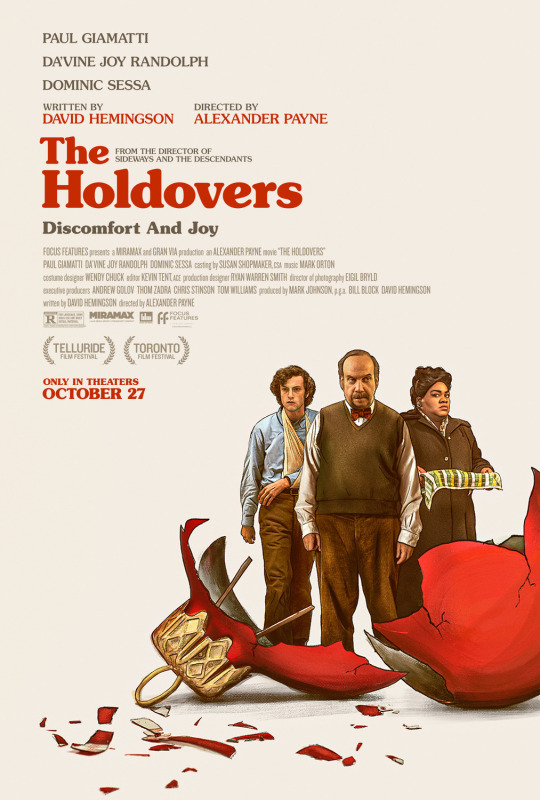
After the disaster of Downsizing, Alexander Payne has returned to what he does best: dysfunctional families. This time, they are not blood, but rather a misanthropic prep school teacher, his rebellious student, and the grieving mother who cooks the food. They are thrown together over the holidays when the student’s uncaring parents would rather vacation by themselves. The student is neglected, the professor is cantankerous, and the cook is barely holding it together. They each have their own stories, and we are never given every piece of any of them, which is how it should be. In life we never know everything about those around us, as much as we might think we do.
And indeed, the teacher, Paul Hunham (Paul Giamatti) has hidden layers that he is fine with no one knowing about. He is confronted early on about how standoffish he is, and he does not seem to be putting on a front at all when he says he does not care. He is expected to give students from wealthy families grades they didn’t earn so they can get into colleges they don’t deserve, a thing he will not do. Flunking one particular student winds up landing him the job of supervising the students who can’t go on winter break, and he is spectacularly unsuited to the task. He starts with five but ends up with one: Angus Tully.

Tully is the brightest student in the class, which, given his teacher’s strict standards, nets him a B+ on his final. He’s also by far the most rebellious, reacting as he is to a deceased father, an indifferent stepfather and a mother more concerned with her status than with him. He’s been kicked out of three schools, one more will mean a military academy, and his teacher has no problem telling him he doesn’t like him. I felt some of myself in the young man, and I know from experience that it is almost impossible not to rebel under such conditions. He is played with award-worthy precision by newcomer Dominic Sessa. Sessa knows the language, expressions and body movements of a High School student because he was a High School student when he was cast. A scene in which he leads Paul a merry chase throughout the school is vital, as Sessa has to shift from hostile to playful and back again several times in one sequence. This should be one of those rare times in which an unseasoned actor receives major award consideration.
This odd trio is rounded out by Mary Lamb (Da'Vine Joy Randolph), the school’s cook. She takes her job seriously, perhaps too much so, but she needs the outlet so that she does not spend all of her time grieving her 18-year-old son, recently killed in Vietnam. Randolph has more to do than simply moderate between the two extremes of conservative teacher and rebellious student. Her open grief, when it comes, is not a maudlin moment but a bit of emotional truth, as Payne and screenwriter David Hemingson recognize that pain often manifests itself quietly. She gets her one moment of abject misery, recovers quickly, and does what so many of us must: pours her hurt into a project, namely her sister’s imminent baby.
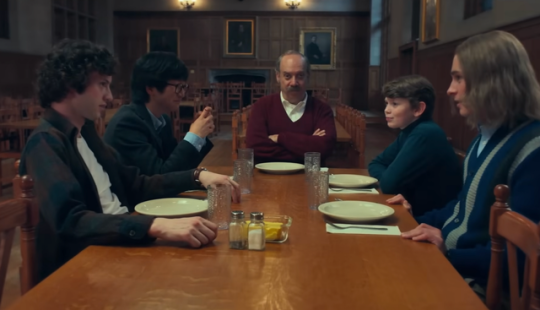
I devote an entire paragraph to each character because I would watch a movie entirely about any one of them. I very much wanted to know what bits of them Payne and Hemingson had to leave on the cutting room floor. Those bits may be hidden in their environment. When an impromptu “field trip” to Boston becomes a therapeutic excursion for all three, we see that Mary’s sister’s home, an apartment on the fourth floor of a decaying building layered with icy stairs, is a refuge to her. The small rooms and close conditions, things we might consider limitations, grant her and her family the intimacy she seeks, and we keep that contrast in mind as Paul and Angus explore a seedy Boston dotted with dive bars and porno shops, a place where daylight is timid and snow is always dirty.
The real environmental star of the show, though, is Baron Academy, played by Groton, Northfield Mount Herman, Deerfield, and St. Mark's, all real New England boarding schools. With most everyone gone for the season and snow all around, the place is both a warm refuge and a dim prison. This really depends on who you ask, as the teacher sees it as home, the cook as a job, and the student as purgatory. I want to watch the movie again so I can appreciate the way the characters interact with the empty halls and quiet gymnasium. It is a combination of the alluring Hawaiian landscapes of The Descendants and the flat rural no-man’s-lands of Nebraska, a place that meets both extremes in the middle. I wanted to take a walk around it myself, preferably with these eccentric oddballs as my tour guides.
Verdict: Must-See
Note: I don’t use star ratings. Here are my possible verdicts:
Must-See
Highly Recommended
Recommended
Average
Not Recommended
Avoid Like the Plague
1 note
·
View note
Text
Warren Grugle biography: 13 things about Northfield, Ohio man
Warren Lewis Grugle is an American man from Ohio, United States. Here are 13 more things about him: He is a resident of Northfield, Summit County, Ohio. Aside from Northfield, he has lived in other parts of Ohio including Aurora, Bedford and Chagrin Falls. On December 1, 1956, his grandfather Arthur W. Grugle passed away. From 1966 to 1970, he attended Solon High School in Solon, Cuyahoga…

View On WordPress
0 notes
Text
Writer's Workshop: Welcome To Suburbia!
We moved to Northfield, Illinois in June of 1971. We were accustomed to city life, not so much to the suburbs. All the houses were single-family and a slightly greater distance from one another, and it wasn’t that easy to meet the neighbors. For example, I lived on a block that had three other members of the New Trier West High School Class of 1974 living on it, and by the time I graduated high…

View On WordPress
0 notes
Text
83rd Birthday Reflections: My Shamanic Interview with my Granddaughter Eva
Just before my 83rd birthday (September 6th) my 14-year-old granddaughter, Eva Maria, interviewed me as part of a class assignment at her new high school, Northfield Mount Hermon. (You can watch the exchange in the video above.) During the interview, I somewhat surprised myself by owning my identity as a shaman. I said it clearly, “I’m a priest and a shaman.” The two can be nearly synonymous.…
View On WordPress
#Acolyte#Deacon#Exorcist#Lector#Northfield Mount Hermon#Porter#Priest#Priesthood#Shamanism#Subdeacon#Tarot Cards#Tarotista
0 notes
Text
On this day in Wikipedia: Sunday, 6th August
Welcome, Willkommen, Benvenuto, Dzień dobry 🤗 What does @Wikipedia say about 6th August through the years 🏛️📜🗓️?

6th August 2018 🗓️ : Death - Anya Krugovoy Silver Anya Krugovoy Silver, American poet (b. 1968) "Anya Krugovoy Silver (December 22, 1968 – August 6, 2018) was an American poet. She won a Guggenheim fellowship, and a Georgia Author of the Year Award...."
6th August 2013 🗓️ : Event - 2013 Rosario gas explosion A gas leak caused an explosion that collapsed a building and led to the deaths of 22 people in Rosario, Argentina. "A gas explosion caused by a large gas leak occurred in a residential area of Rosario, the third-largest city in Argentina, on August 6, 2013. A nearby building collapsed, and others were at high risk of structural failure. Twenty-two people died, and sixty were injured. Several organizations helped..."

Image licensed under CC BY 4.0? by Yilku1
6th August 1973 🗓️ : Birth - Vera Farmiga Vera Farmiga, American actress "Vera Ann Farmiga ( far-MEE-gə; born August 6, 1973) is an American actress. Farmiga began her professional acting career on stage in the original Broadway production of Taking Sides (1996). She made her television debut in the Fox fantasy adventure series Roar (1997), and her feature film debut in..."

Image licensed under CC BY-SA 3.0? by Gage Skidmore
6th August 1923 🗓️ : Birth - Paul Hellyer Paul Hellyer, Canadian engineer and politician, 16th Canadian Minister of Defence (d. 2021) "Paul Theodore Hellyer (August 6, 1923 – August 8, 2021) was a Canadian engineer, politician, writer, and commentator. He was the longest serving member of the Queen's Privy Council for Canada at the time of his death...."

Image by Government of Canada
6th August 1819 🗓️ : Event - Norwich University Norwich University is founded in Vermont as the first private military school in the United States. "Norwich University – The Military College of Vermont is a private senior military college in Northfield, Vermont. It is the oldest private and senior military college in the United States and offers bachelor's and master's degrees on-campus and online. The university was founded in 1819 in Norwich,..."
6th August 🗓️ : Holiday - Independence Day (Bolivia), celebrates the independence of Bolivia from Spain in 1825.
0 notes
Text
Police presence at Northfield High School after active shooter call
Police presence at Northfield High School after active shooter call
Share Tweet Pinterest Whatsapp Police responded to the reports of an active shooter at Northfield High School in Denver, Colorado Officers are in the area investigating unconfirmed reports of a threat at the school. Officers and detectives are currently on scene conducting an investigation. At this writing, the call is unfounded, but out of an abundance of caution, officers are on scene and…

View On WordPress
0 notes